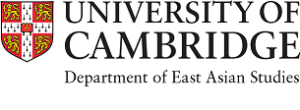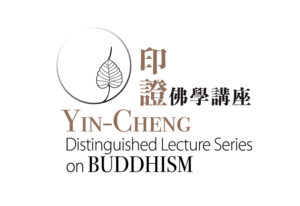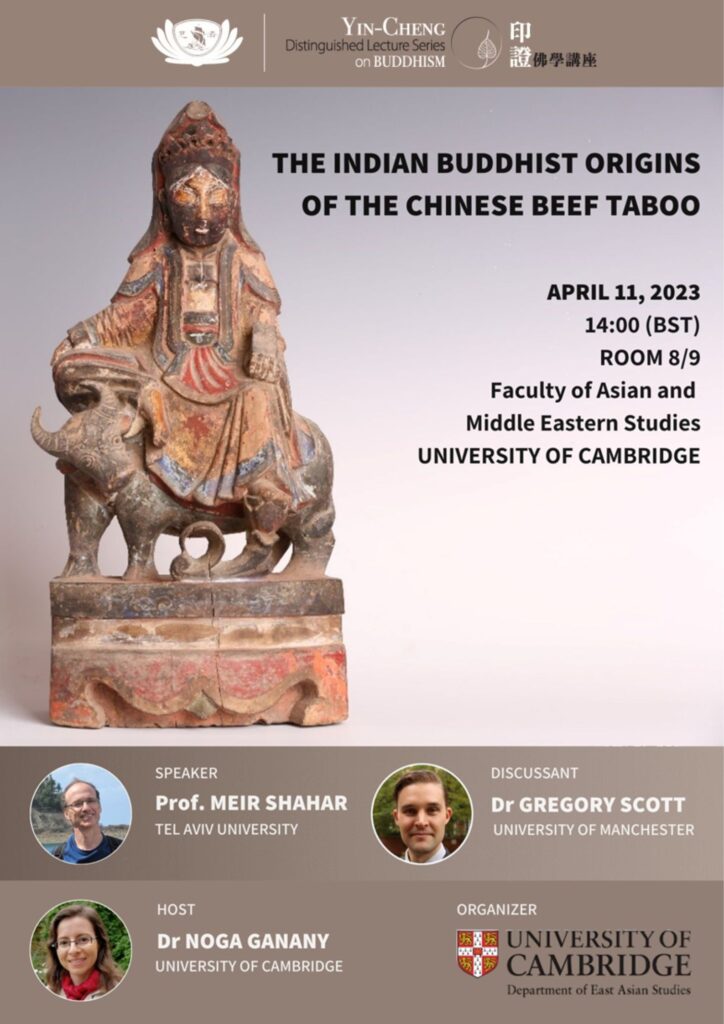Time: April 11, 14:00 BST
Speaker: Prof. Meir Shahar (Tel Aviv University)
Discussant: Dr. Gregory Scott (University of Manchester)
Host: Dr. Noga Ganany (University of Cambridge)
Date: April 11, 2023 (Tuesday)
Time: 14:00 BST
Venue: Room 8-9, Faculty of Asian and Middle Eastern Studies (Sidgwick Avenue, Cambridge, CB3 9DA)
Abstract: During the late-imperial period, the beef taboo was widely propagated in China. Many people (especially in South China) refrained from consuming the meat of buffaloes and oxen (both species being referred to by same term: niu). The dietary prohibition was related to the divinity of the animal. Legend had it that that the ox (and/or buffalo) was a Buddhist deity who descended from Heaven for the express purpose of pulling the plow. The animal was a god who sacrificed itself for its owner’s sake. Eating if flesh was not only thankless, it was blasphemous.
In this paper, I trace the origins of the late-imperial Chinese beef taboo to ancient India. I argue that Buddhism served as a vehicle introducing the Indian inviolability of the cattle to China. The sanctity of the Chinese ox/buffalo derived from the divinity of the Indian cow. The paper highlights the role of Buddhism in bringing Indian civilization to bear upon Chinese culture and religion. It also reveals a neglected aspect of Buddhist dietary practice. At least in certain times and places, Buddhist clerics advocated the inviolability of the cattle as distinct from other animal species. They refrained from consuming beef as distinct from other meats.
About the Speaker:
 Meir Shahar is the Shoul N. Eisenberg Chair for East Asian Affairs at Tel Aviv University. He is the author of numerous books on Chinese religion, including Crazy Ji: Chinese Religion and Popular Literature (1998); Oedipal God: The Chinese Nezha and his Indian Origins (2015); and The Shaolin Monastery: History, Religion, and the Chinese Martial Arts (2008), which has been translated into many languages. Meir Shahar is currently completing a book titled Kings of Oxen and Horses: Draft Animals, Buddhism, and Chinese Rural Religion.
Meir Shahar is the Shoul N. Eisenberg Chair for East Asian Affairs at Tel Aviv University. He is the author of numerous books on Chinese religion, including Crazy Ji: Chinese Religion and Popular Literature (1998); Oedipal God: The Chinese Nezha and his Indian Origins (2015); and The Shaolin Monastery: History, Religion, and the Chinese Martial Arts (2008), which has been translated into many languages. Meir Shahar is currently completing a book titled Kings of Oxen and Horses: Draft Animals, Buddhism, and Chinese Rural Religion.
About the Discussant: Dr. Gregory Adam Scott is originally from Canada, and studied at York University and the University of Toronto prior to completing his PhD in Chinese Buddhism at Columbia University in 2013. He then worked as a postdoctoral fellow at the Institute for Advanced Studies in the Humanities at the University of Edinburgh, and then completed a three-year Leverhulme Early Career Fellowship in the Asian Studies department at Edinburgh before joining the University of Manchester in September 2017. He is currently Senior Lecturer in Chinese Culture and History and Programme Director for Chinese Studies at the University of Manchester. His book, Building the Buddhist Revival: Reconstructing Monasteries in Modern China (OUP 2020) explores how and why Buddhist sacred sites were rebuilt in China in the late 19th and early 20th centuries, and how reconstruction provided religious communities with an opportunity for innovation. His next project will explore Buddhist print culture in Republican China.
See original post
About the Yin-Cheng Distinguished Lecture Series: Launched in September 2021, the Yin-Cheng Distinguished Lecture Series (印證佛學傑出學術系列講座) is a collaborative, multi-university partnership between Peking University, University of Oxford, University of Cambridge, Inalco (Institut national des langues et civilisations orientales), Princeton University, Harvard University, and the University of British Columbia. The Lecture Series is established in honour of Venerable Cheng-yen 證嚴, founder of Tzu Chi, and her mentor Yinshun 印順 (1906–2005), with the goal of promoting topics in Buddhist Studies.
Click here to download the poster











